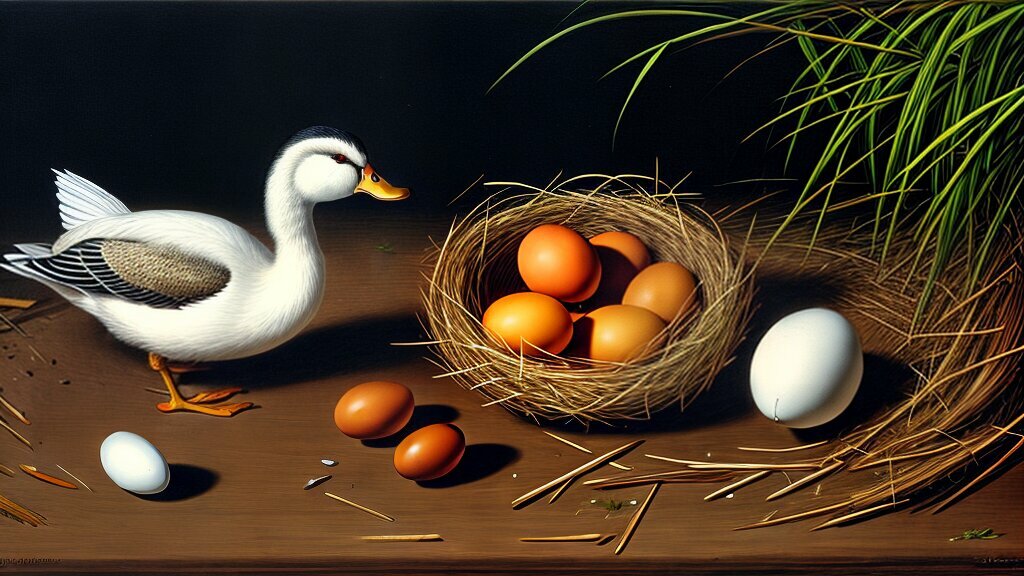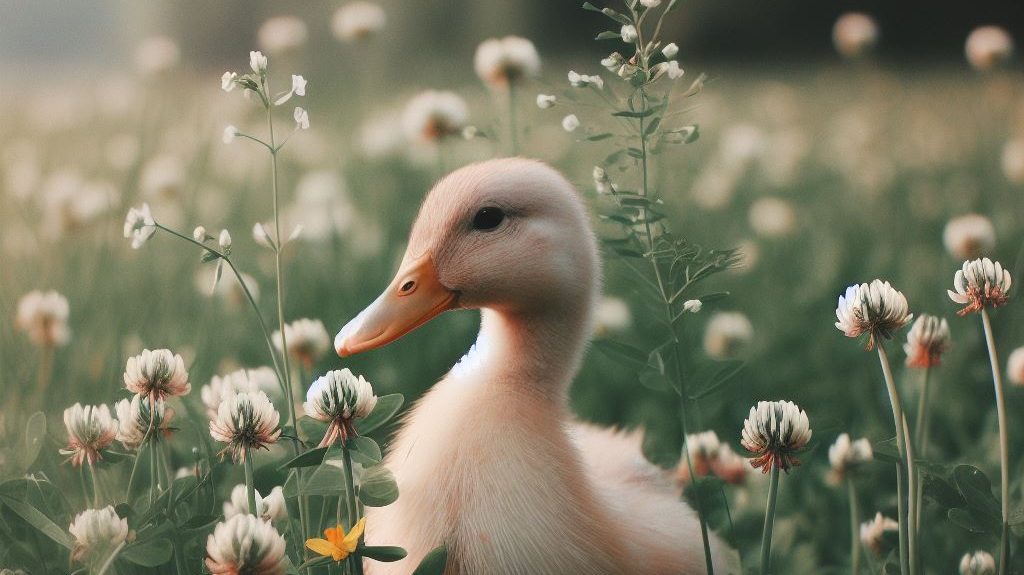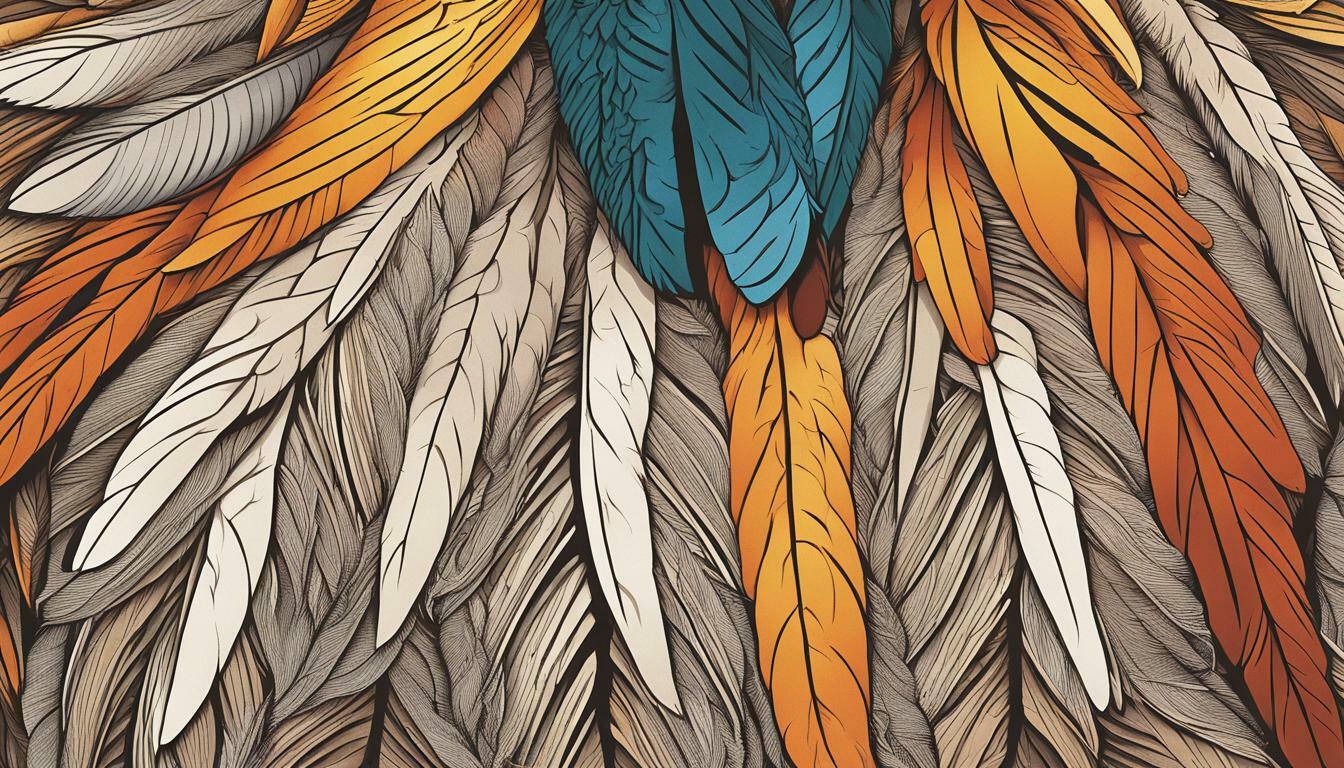Can Ducks Eat Pasta? Benefits, Risks and Food Safety Tips
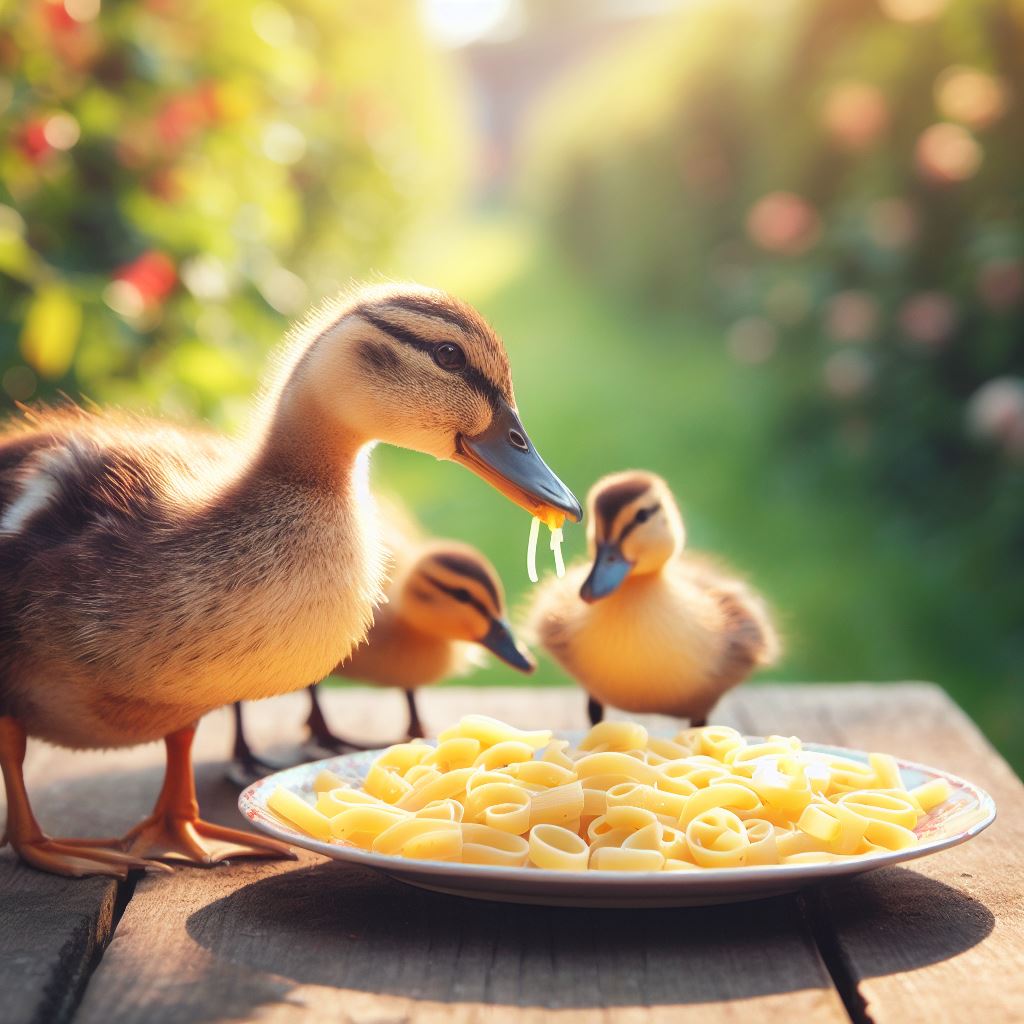
Table of content:
- What Types of Pasta Can Ducks Eat?
- What is the Proper Portion Size of Pasta for Ducks?
- Nutritional Considerations When Feeding Pasta to Ducks
- Food Safety Tips When Feeding Pasta to Ducks
- What are the Benefits and Risks of Feeding Pasta to Ducks?
- Signs of Health Issues in Ducks Fed Pasta
- Frequently Asked Questions about Feeding Pasta to Ducks
- Conclusion
Can ducks eat pasta? This is a common question for duck owners looking to provide their ducks with a healthy, balanced diet. The short answer is yes, ducks can eat certain types of cooked pasta in moderation as part of a varied diet. Read on to learn more about feeding pasta to ducks, including what types of pasta ducks can and cannot eat, proper portion sizes, nutritional considerations, and food safety tips.
Key Takeaways:
- Ducks can eat some types of cooked pasta like elbow macaroni, spirals, small shells or bowties as an occasional treat. Avoid long, stringy or raw pasta.
- Only feed ducks plain pasta with no added sauce, seasoning or salt. Opt for whole grain when possible.
- Limit pasta to no more than 10% of a duck’s daily food intake. It should not be a diet staple.
- Cook pasta thoroughly and let it cool before feeding to ducks to avoid choke/crop burn hazards.
- To feed pasta safely, spread it out on a feeding platform or pond edge so ducks don’t gobble it down too quickly.
- Pasta provides carbs and some nutrients but lacks vital protein and minerals ducks need. Supplement with poultry feed.
- Monitor ducks for signs of obesity, malnutrition, diarrhea or other issues when feeding any new foods. Adjust portions as needed.
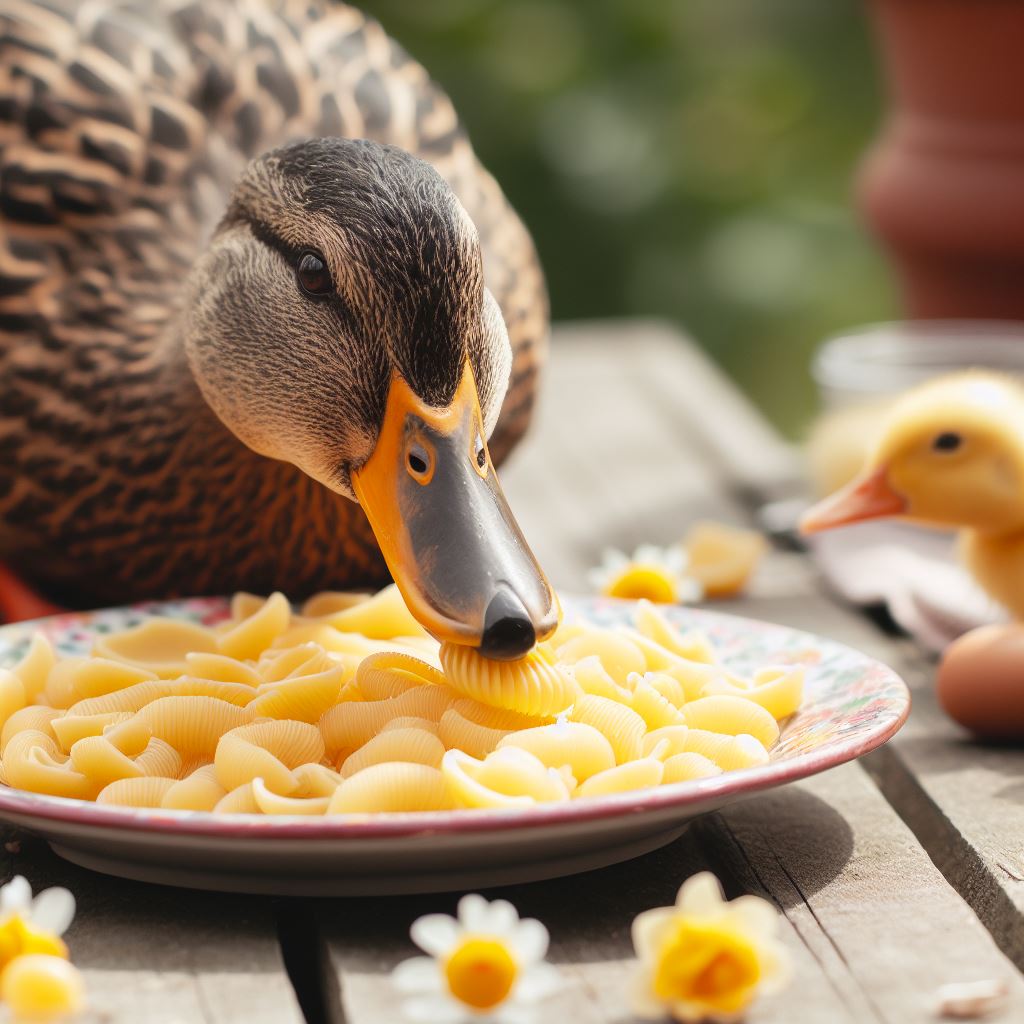 What Types of Pasta Can Ducks Eat?
What Types of Pasta Can Ducks Eat?
Not all pasta is suitable for ducks. Here are some guidelines on what types of pasta ducks can and cannot eat:
Safe Pasta for Ducks
- Small shaped dried pasta: Small pasta shapes like elbow macaroni, spirals, mini farfalle, ditalini, small shells or bowties are a good choice. Their bite-sized pieces are easy for ducks to eat.
- Whole grain varieties: Opt for whole grain pasta when possible for added nutritional value. Whole wheat, spinach or tomato pastas provide extra vitamins.
- Well-cooked, cooled pasta: Ensure any pasta fed to ducks is thoroughly cooked until soft and then cooled before feeding. This helps avoid choke hazards or potential crop burns.
Unsafe Pasta for Ducks
- Long, stringy fresh pasta: Long pasta shapes like spaghetti, linguine, fettuccine or angel hair are risky due to potential choking hazards. Avoid these.
- Uncooked or undercooked pasta: Raw or crunchy pasta can get lodged in a duck’s throat or crop and cause injuries or death. Always cook pasta well.
- Seasoned pasta or pasta with sauce: Avoid feeding ducks pasta with any added salt, oil, spices, pesto, tomato sauce or other flavorings. These can be unhealthy.
- Pasta made with egg: Egg pasta has more fat and protein than ducks need. Stick to regular flour-based pasta instead.
- Buttered, cheesy or other enriched pasta: Do not feed ducks Alfredo pasta, macaroni and cheese, lasagne or other pasta dishes containing butter, cheese or cream.
What is the Proper Portion Size of Pasta for Ducks?
When feeding pasta to ducks, moderation is key. Here are some tips on proper portion sizes:
- Pasta should make up no more than 10% of a duck’s total daily food intake.
- For an average adult duck, feed 1/4 to 1/2 cup cooked pasta per day maximum as an occasional treat.
- Spread pasta out over a large area rather than piled in one place so ducks don’t gobble it down too quickly.
- Monitor ducks as they eat and adjust portions up or down as needed to maintain good health and weight.
- Reduce or eliminate pasta if ducks seem too heavy, have loose droppings or show other signs of nutritional imbalance.
- Ducklings and younger ducks need less pasta than fully grown adults. Start with just a few pieces at a time.
Nutritional Considerations When Feeding Pasta to Ducks
Here is some information on the nutritional value of pasta for ducks and how to supplement it:
- Pasta provides carbohydrates for energy and small amounts of B vitamins and minerals. But it lacks adequate protein, calcium or other nutrients ducks need.
- While whole grain pasta has more nutrients than plain white pasta, it is still not a complete diet for ducks.
- Always feed a quality complete duck feed as the dietary staple to provide balanced nutrition.
- Supplement pasta by also offering duck-friendly fruits, vegetables, seeds, greens, insects and grit.
- Avoid over-feeding pasta or carbohydrate-heavy foods. Excess can contribute to obesity and angel wing in domestic ducks.
Food Safety Tips When Feeding Pasta to Ducks
To feed pasta to ducks safely and avoid potential health issues, keep these food safety guidelines in mind:
- Store any leftover pasta in the refrigerator and discard it after 2-3 days to prevent mold or bacteria growth.
- Cook pasta thoroughly to at least 160°F internal temperature to kill any foodborne pathogens. Let it cool before feeding.
- Wash hands and all feeding equipment in hot, soapy water before and after use to prevent spread of salmonella.
- Monitor for signs of spoiled feed like mold, rancid smell, sliminess. Discard any spoiled pasta.
- Don’t allow uneaten pasta to sit out for prolonged periods, as it can harbor dangerous bacteria and attract pests/predators.
- Clean up any stale, wet pasta around feeding areas to prevent harmful algal growth in water sources.
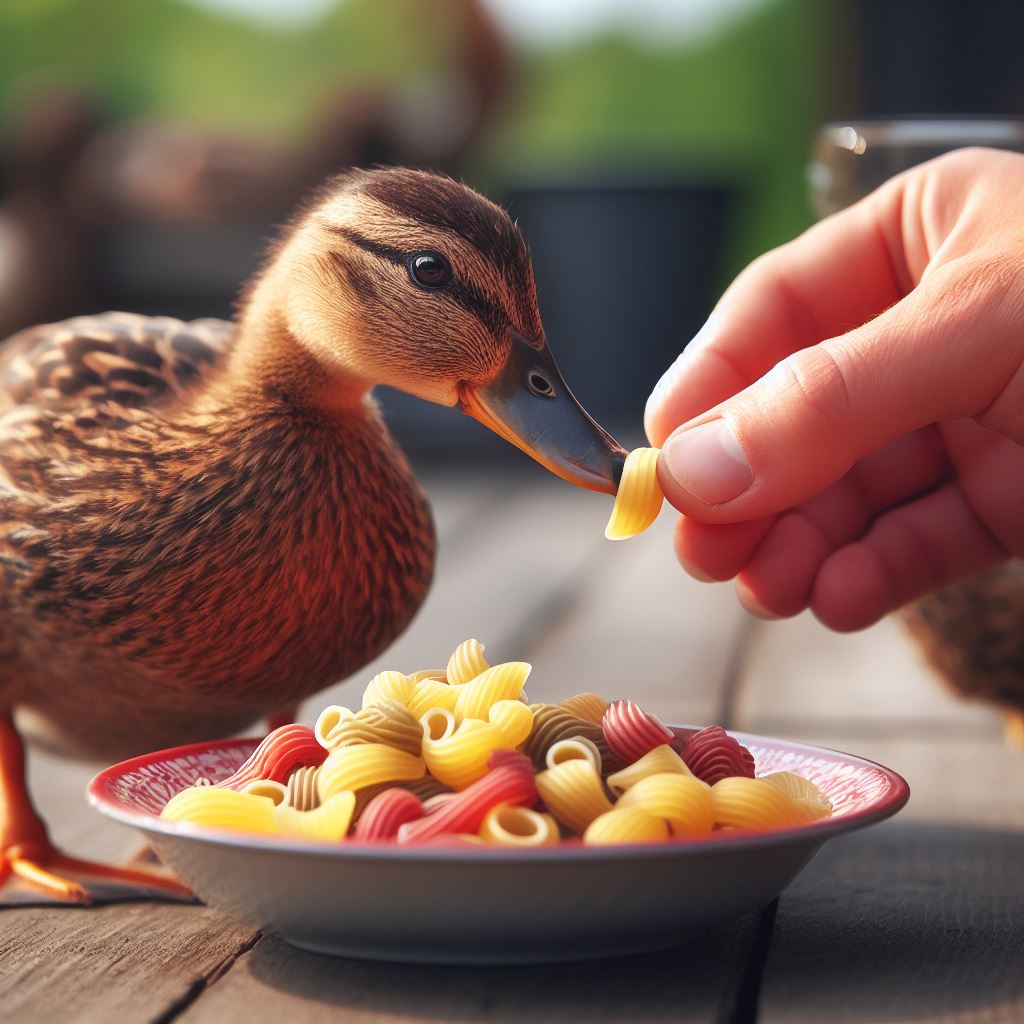 What are the Benefits and Risks of Feeding Pasta to Ducks?
What are the Benefits and Risks of Feeding Pasta to Ducks?
| Benefits | Risks |
|---|---|
| Provides easily digested carbohydrates for energy | Can cause obesity if overfed |
| Adds variety to diet | Risk of crop impaction or choking on long pasta |
| Whole grain pasta provides some vitamins & minerals | cooked pasta lacks adequate protein, calcium & nutrients |
| Most ducks enjoy eating small pasta pieces | Prefilling crops with pasta may limit nutritious diet intake |
| Can help domestic ducks transition to a pellet diet | Moldy or spoiled pasta can cause illness |
Signs of Health Issues in Ducks Fed Pasta
When introducing any new food for ducks, watch for these signs of potential health problems and adjust their diet accordingly:
- Diarrhea or loose, smelly droppings
- Lack of energy, lethargy
- Reduced appetite or disinterest in food
- Weight gain or obesity
- Weight loss, muscle wasting
- Angel wing deformation in young ducks
- Feather deficiencies or abnormal molting
- Bloating or distended crop
- Difficulty swallowing or regurgitation
- Choking, gagging or coughing when eating
- Struggling to chew or digest food
Frequently Asked Questions about Feeding Pasta to Ducks
Can I feed my ducks leftover pasta?
Leftover plain pasta can be fed to ducks in moderation, but avoid pasta with any seasonings, sauce or fat/oil. Refrigerate leftovers promptly and discard any that seem spoiled. Reheat to steaming before feeding.
Is pasta good for baby ducks and ducklings?
You can offer tiny pieces of thoroughly cooked, cooled pasta as an occasional treat to ducklings over 4 weeks old as they transition to solid food. But a commercial duck starter feed should be their dietary staple for balanced nutrition.
Can wild ducks eat pasta?
Wild ducks are not adapted to digest significant amounts of cooked starch. While small amounts of plain cooked pasta are not immediately harmful, it provides little nutritional value. Their natural diet of seeds, greens and insects is healthier.
What about feeding macaroni and cheese to ducks?
Avoid feeding ducks macaroni and cheese, alfredo pasta or other cheese/cream-based pasta dishes. The high fat and salt content is unhealthy for ducks. Plain elbow macaroni in moderation is a better option.
Can I feed pasta to ducks daily or as a meal?
Pasta should be an occasional treat, not a daily staple or complete meal. The lack of protein, vitamins and minerals in pasta makes it unsuitable as a sole diet. Offer no more than 1/2 cup per duck a few times a week maximum.
Can ducks eat pasta?
Yes, ducks can eat some types of cooked pasta in moderation, such as elbow macaroni or small pasta shapes. Avoid long or stringy pasta that could pose a choking hazard.
What kind of pasta can ducks eat?
Ducks can eat small, bite-sized pasta shapes like elbow macaroni, ditalini, mini farfalle, shells or bowties. Whole grain varieties provide more nutrients. Avoid stringy or long pasta.
Is pasta bad for ducks?
Pasta lacks key protein and nutrients ducks need. Feeding too much pasta can lead to obesity, malnutrition, diarrhea and other health issues. But small amounts of plain pasta are okay as an occasional supplement if ducks are also fed a nutritious balanced diet.
Conclusion
In conclusion, ducks can eat limited amounts of properly cooked, plain pasta on occasion as a supplemental treat. However, a varied diet with duck feed, produce, insects and grit is vital to provide balanced nutrition.
Monitor ducks closely when offering new foods and adjust portions as needed. With some safety precautions and by limiting intake, small pasta pieces can be a fun dietary addition for pets or domestic ducks.
Welcome. I’m Adreena Shanum, the proud owner of this website, and I am incredibly passionate about animals, especially poultry. I founded adreenapets.com as a labor of love, stemming from my desire to share my knowledge and experiences with poultry enthusiasts worldwide.


